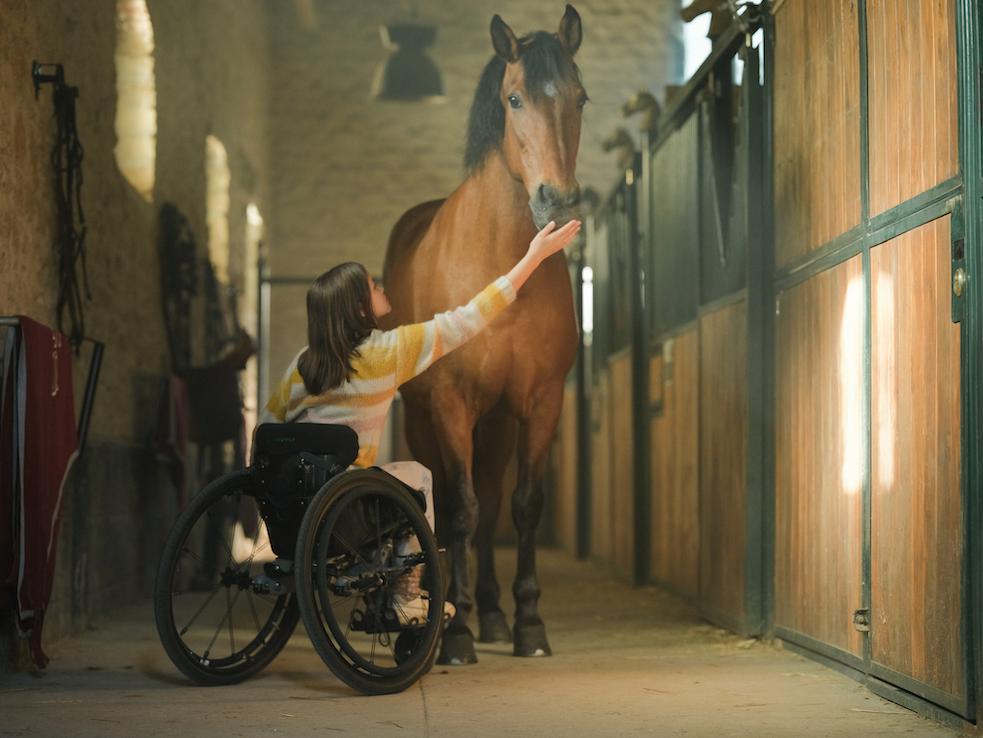Ten years after Jappeloup, film director Christian Duguay is once again reconnecting with the equestrian world, but this time in the world of trotting races. His film Storm is released in theaters this Wednesday, December 21. A nice cast, made up in particular of Pio Marmaï, Mélanie Laurent and Carmen Kassovitz, brings this family film about reconstruction and resilience to life. Interview with the director.
Still from the movie Tempest.
© Julien Panié/Nolita Cinema
Where did you get the idea of adapting “Tempête au Haras”, Christophe Donner’s youth novel?
This was suggested to me by my two producers, Romain Rousseau and Maxime Delauney. They had seen Jappeloup, who had pleased them. In the book, the author talks about handicap and the world of horses. I wanted to show the contact between man and horse, beyond racing, training and breeding. I wanted to show the horse as an accompanying person, as a life companion. I also wanted to talk about the virtues of equine therapy! I really liked the intimate relationship between the horse and the characters, and the spectacular side of the racing world (see trailer at the bottom of the article).
Is it a world you already knew?
No way! I met people from that world, notably Pierre and Camille Levesque, who are great breeders and great racing competitors. I also visited stud farms in Normandy (Storm was filmed at the Haras du Plessis, in the Oise, editor’s note). Thanks to these discoveries, the narration of the film was built. The world of racing is often stigmatized because we believe that there are only PMUs, bets, and that we push the horses to the limit. I discovered another world, a relationship with the horse as it should always be, with horses at the center of concerns. There is a real man-horse tandem, because the horse needs the man to win and vice versa. In this universe, the horse is an athlete who is trained, programmed. Thoroughbreds carry in their genetics to love to run, to love competition. I discovered a universe and I am happy to share it!
It’s about disability and resilience in Tempête. Are these topics close to your heart?
What I remembered from Christophe Donner’s book is the journey of this little boy until he was seventeen. I liked the way the author approaches the handicap and how, thanks to the resilience, one can manage to overcome his demons to live his dream. In my film, I simply transformed the little boy into a little girl and I integrated the character of Sébastien (performed by Kacey Mottet Klein, editor’s note), whose disability is not really defined. He is adopted by the family and has a gift with horses. I tried to create a serene, pure and passionate universe around horses, in which, when something bad happens like Zoé’s accident, holding together makes it possible to overcome the obstacles that come our way.
“My dream would have been to participate in the 1976 Olympics”

Still from the movie Tempest.
© Julien Panié/Nolita Cinema
You are a rider yourself, what is your equestrian background?
I was Junior Dressage Champion at the Royal Agriculture Winter Fair (annual agricultural fair held in Toronto, Canada, editor’s note) in the 1970s. My dream would have been to participate in the 1976 Olympic Games. Unfortunately the horse I was riding, an English Thoroughbred named Fraterno, belonged to my father’s wife, who sold it. I had forged a very strong bond with him! He was a dressage horse and I took him to the top level. It was a terrible loss for me because we had a very special bond. I was very scarred, so I didn’t want to ride for about thirty years. I finally reconnected with this universe, and talking about the link between men and horses is important to me. I do it a little for that horse and for the love and happiness he brought me between my sixteen and twenty years.
Your actors really took part in the scenes with the horses, how did the shooting go?
Pio Marmaï had never ridden. It was six intense weeks, which started in a box to brush the horse, to make contact with him. He learned to make his gestures automatic with the sulky, then started dueling on straight lines. When he was ready, we put him in a platoon of ten horses. I am always looking for authenticity. Pio learned very quickly, he really wanted to be in it and he did it extraordinarily well. Same for Carmen Kassovitz, who was a seasoned rider but who had never trot. She invested herself in a sublime way.
Again, you called on your longtime friend Mario Luraschi to work with you on the film.
I wrote scenes that spoke about this particular relationship with horses, and made him play the horses. He is able to transfer the contact he has with the horse to the actor. Suddenly, the horse begins to play comedy with the actor, whether in the look, the emotions, the fear, the apprehension. There aren’t many Marios in the world, people who have this way of talking to horses and being in the exchange. It is an almost spiritual language.
“Talking about the link between men and horses is important to me”, Christian Duguay

